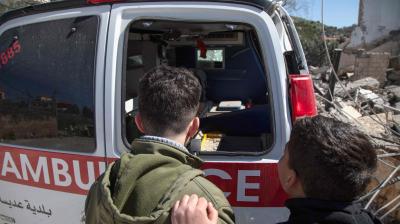Brussels airport departure hall reopens
Molenbeek residents say ‘family neighbourhood’ unfairly stigmatised
Molenbeek residents say ‘family neighbourhood’ unfairly stigmatised
Brussels airport is partially reopening its departure hall on Sunday, about six weeks after ISIS suicide bombers killed 16 people there in blasts that gutted parts of the building.
The two attackers detonated suitcase bombs in the departure hall on March 22, before a third bomber blew himself up on a metro train in the city. In all, they killed 32 people.
From Monday, 111 check-in counters will be open in the airport departure hall and another 36 in a temporary building, according to the airport management company. This brings departure passenger capacity to at least 80 per cent of that before the attacks, it said. “The reopening is an important moment for the entire airport community and Belgium,” said Arnaud Feist, CEO of Brussels Airport Company.
Meanwhile, residents of Brussels’ Muslim-dominated district of Molenbeek feel the “family neighbourhood” has been unfairly stigmatised due to the evil acts “of a few” persons.
Molenbeek, a borough of about 100,000 people with large communities of Moroccan and Turkish-origin that are thoroughly middle-class, grabbed media attention worlwide post the Paris and Brussels attacks as having become an almost ideal recruiting ground for the dreaded ISIS terror group.
Salah Abdeslam, the only surviving direct participant in the Paris attacks, hid in Molenbeek before his arrest on March 18. Abdelhamid Abaaoud, the suspected chief planner of the Paris attacks, lived in Molenbeek. In all, at least 14 people tied to both attacks were either Belgian or lived in Brussels.
Molenbeek residents are still reeling as the stigma of terrorism has devastated the neighbourhood. However most of them insist people should not generalise and the area is essentially like any other family commune.
“I am a resident here and we have no problems staying in this locality even after the attacks. We are a community of majority of immigrants so it is natural for people to look at us with a suspicious eye. But one or two persons have given us a bad name,” Nora Laarissi, a resident, said. Asked whether there was an unfair stigmatisation of the area, she responded in the affirmative.

















